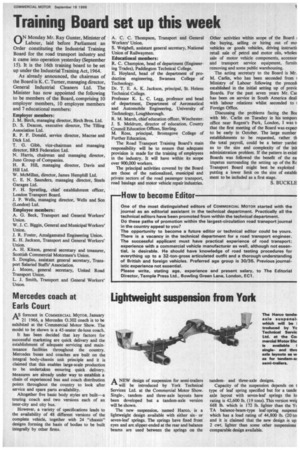Training Board set up this week
Page 103

If you've noticed an error in this article please click here to report it so we can fix it.
ON Monday Mr. Ray Gunter, Minister of Labour, laid before Parliament an Order constituting the Industrial Training Board for the road transport industry and it came into operation yesterday (September 15). It is the 16th training board to be set up under the Industrial Training Act, 1964.
As already announced, the chairman of the Board is K. C. Turner, managing director, General Industrial Cleaners Ltd. The Minister has now appointed the following to be members of the Board, comprising 10 employer members, 10 employee members and 7 educational members:
Employer members:
J. M. Birch, managing director, Birch Bros. Ltd. D. S. Deacon, executive director, The Tilling Association Ltd.
R. P. F. Donald, service director, Macrae and Dick Ltd.
T. G. Gibb, vice-chairman and managing director, BRS Federation Ltd.
N. Harris, chairman and managing director, Juno Group of Companies.
H. R. Hill, managing director, Davis and Hill Ltd.
W. McMillan, director, James Hemphill Ltd.
C. E. N. Saunders, managing director, Steels Garages Ltd.
F. H. Spratling, chief establishment officer, London Transport Board.
J. P. Wells, managing director, Wells and Son (London) Ltd.
Employee members:
A. G. Beck, Transport and General Workers' Union.
W. J. C. Biggin, General and Municipal Workers' Union.
J. R. Foster, Amalgamated Engineering Union.
K. H. Jackson, Transport and General Workers' Union, A. H. Kitson, general secretary and treasurer, Scottish Commercial Motormen's Union.
S. Douglas, assistant general secretary, Transport Salaried Staffs' Association.
J. Moore, general secretary, United Road Transport Union.
L. J. Smith, Transport and General Workers' Union. A. C. C. Thompson, Transport and General Workers' Union.
S. Weighell, assistant general secretary, National Union of Railwaymen.
Educational members:
R. C. Champion, head of department (Engineering Trades), Paddington Technical College.
E. Hoyland, head of the department of production engineering, Swansea College of Technology.
Dr. T. E. A. K. Jackson, principal, St. Helens Technical College.
Professor K. L. C. Legg, professor and head of department, Department of Aeronautical and Automobile Engineering, University of Technology, Loughborough.
R. M. Marsh, chief education officer, Winchester. J. S. Meldrum, director of education, County Council Education Offices, Sterling.
M. Ross, principal, Bromsgove College of Further Education.
The Road Transport Training Board's main responsibility will be to ensure that adequate provision is made for the training of employees in the industry. It will have within its scope over 900,000 workers.
The principal activities covered by the Board are those of the nationalized, municipal and private sectors of the road passenger transport, road haulage and motor vehicle repair industries.
Other activities within scope of the Board ; the buying, selling or hiring out of mo vehicles or goods vehicles, driving instructil retail sale of petrol and motor oils, wholes sale of motor vehicle components, accessor and transport service equipment, furniti removing and some public warehousing.
The acting secretary to the Board is Mr. M. Carlin, who has been seconded from I Ministry of Labour following the preced4 established in the initial setting up of previc Boards. For the past seven years Mr. Cat has been on service in South America deali with labour relations whilst seconded to I Foreign Office.
Discussing the problems facing the Bol. with Mr. Carlin on Tuesday in his temport office near Regent's Park, London, I was ti that the first meeting of the Board was expeci to be early in October. The large number establishments to be requested, rather th the total payroll, could be a better yardsti as to the size and complexity of the Mit administration problem. If the pattern in existi Boards was followed the benefit of the ea impetus surrounding the setting up of the Rc Transport Board might best be exploited putting a lower limit on the size of establi: ment to be included as a first stage.
S. BUCKLE




















































































































































































































































































